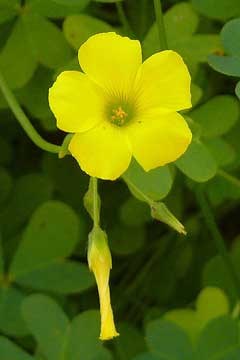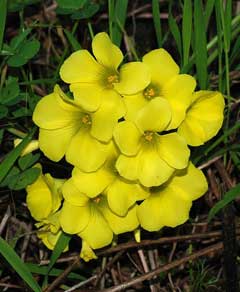 |
|
http://commons.wikimedia.org/wiki/User:MathKnight |
 |
| http://commons.wikimedia.org/wiki/User:Alvesgaspar |
Translate this page:
Summary
Physical Characteristics

 Oxalis pes-caprae is a PERENNIAL growing to 0.2 m (0ft 8in) by 0.3 m (1ft).
Oxalis pes-caprae is a PERENNIAL growing to 0.2 m (0ft 8in) by 0.3 m (1ft).
See above for USDA hardiness. It is hardy to UK zone 9. It is in leaf from October to June, in flower from March to June, and the seeds ripen from April to June. The species is hermaphrodite (has both male and female organs) and is pollinated by Insects.
Suitable for: light (sandy) and medium (loamy) soils and prefers well-drained soil. Suitable pH: mildly acid, neutral and basic (mildly alkaline) soils. It cannot grow in the shade. It prefers dry or moist soil.
UK Hardiness Map
US Hardiness Map
Synonyms
O. cernua.
Plant Habitats
Cultivated Beds; South Wall. In. West Wall. In.
Edible Uses
Edible Parts: Flowers Leaves Root
Edible Uses:
Leaves - raw or cooked[2, 173]. A pleasant acid flavour, the make a pleasant addition to mixed salads, whilst children especially like to eat them on their own[K]. Use in moderation, see notes at top of sheet. Flowers - raw[K]. A pleasant acid flavour, they make an attractive addition to the salad bowl[K]. Root - cooked[22, 46, 103, 173].
References More on Edible Uses
Medicinal Uses
Plants For A Future can not take any responsibility for any adverse effects from the use of plants. Always seek advice from a professional before using a plant medicinally.
None known
References More on Medicinal Uses
The Bookshop: Edible Plant Books
Our Latest books on Perennial Plants For Food Forests and Permaculture Gardens in paperback or digital formats.

Edible Tropical Plants
Food Forest Plants for Hotter Conditions: 250+ Plants For Tropical Food Forests & Permaculture Gardens.
More

Edible Temperate Plants
Plants for Your Food Forest: 500 Plants for Temperate Food Forests & Permaculture Gardens.
More

More Books
PFAF have eight books available in paperback and digital formats. Browse the shop for more information.
Shop Now
Other Uses
References More on Other Uses
Cultivation details
Easily grown in a sandy soil in a warm dry position[1]. This species is not very cold-hardy in Britain, though it is naturalized in parts of south-western England[1, 17]. It tolerates temperatures down to about -5°c[90]. Plants spread rapidly when in a suitable environment and can quite easily become a weed in virtually frost-free environments[200, 260]. Plants seldom produce seed in Europe but they spread by means of asexually produced bulbils[200].
References Carbon Farming Information and Carbon Sequestration Information
Temperature Converter
Type a value in the Celsius field to convert the value to Fahrenheit:
Fahrenheit:
The PFAF Bookshop
Plants For A Future have a number of books available in paperback and digital form. Book titles include Edible Plants, Edible Perennials, Edible Trees,Edible Shrubs, Woodland Gardening, and Temperate Food Forest Plants. Our new book is Food Forest Plants For Hotter Conditions (Tropical and Sub-Tropical).
Shop Now
Plant Propagation
Seed - best sown as soon as ripe in a cold frame. Prick out the seedlings into individual pots when they are large enough to handle and plant them out in late spring or early summer. Division in spring. Larger divisions can be planted out direct into their permanent positions. We have found that it is better to pot up the smaller divisions and grow them on in light shade in a cold frame until they are well established before planting them out in late spring or early summer.
Other Names
If available other names are mentioned here
Native Range
AFRICA: Namibia, South Africa (Eastern Cape, Northern Cape, Western Cape)
Weed Potential
Right plant wrong place. We are currently updating this section.
Please note that a plant may be invasive in one area but may not in your area so it's worth checking.
Conservation Status
IUCN Red List of Threatened Plants Status :

Growth: S = slow M = medium F = fast. Soil: L = light (sandy) M = medium H = heavy (clay). pH: A = acid N = neutral B = basic (alkaline). Shade: F = full shade S = semi-shade N = no shade. Moisture: D = dry M = Moist We = wet Wa = water.
Now available:
Food Forest Plants for Mediterranean Conditions
350+ Perennial Plants For Mediterranean and Drier Food Forests and Permaculture Gardens.
[Paperback and eBook]
This is the third in Plants For A Future's series of plant guides for food forests tailored to
specific climate zones. Following volumes on temperate and tropical ecosystems, this book focuses
on species suited to Mediterranean conditions—regions with hot, dry summers and cool, wet winters,
often facing the added challenge of climate change.
Read More
Expert comment
Author
L.
Botanical References
73200
Links / References
For a list of references used on this page please go here
Readers comment
© 2010, Plants For A Future. Plants For A Future is a charitable company limited by guarantee, registered in England and Wales. Charity No. 1057719, Company No. 3204567.